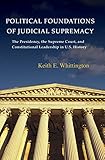Political Foundations of Judicial Supremacy : The Presidency, the Supreme Court, and Constitutional Leadership in U.S. History / Keith E. Whittington.
Material type: TextSeries: Princeton Studies in American Politics: Historical, International, and Comparative Perspectives ; 105Publisher: Princeton, NJ : Princeton University Press, [2009]Copyright date: ©2007Edition: Course BookDescription: 1 online resource (320 p.)Content type:
TextSeries: Princeton Studies in American Politics: Historical, International, and Comparative Perspectives ; 105Publisher: Princeton, NJ : Princeton University Press, [2009]Copyright date: ©2007Edition: Course BookDescription: 1 online resource (320 p.)Content type: - 9780691141022
- 9781400827756
- 347.7312
- KF8748 .W48 2009
- online - DeGruyter
- Issued also in print.
| Item type | Current library | Call number | URL | Status | Notes | Barcode | |
|---|---|---|---|---|---|---|---|
 eBook
eBook
|
Biblioteca "Angelicum" Pont. Univ. S.Tommaso d'Aquino Nuvola online | online - DeGruyter (Browse shelf(Opens below)) | Online access | Not for loan (Accesso limitato) | Accesso per gli utenti autorizzati / Access for authorized users | (dgr)9781400827756 |
Frontmatter -- Contents -- Preface -- ONE. The Politics of Constitutional Meaning -- TWO. The Construction of Constitutional Regimes -- THREE. The Reconstruction of Judicial Authority -- FOUR. The Judiciary in the Politics of Opposition -- FIVE. The Growth of Judicial Authority -- SIX. The Dynamics of Constitutional Authority -- Index -- Backmatter
restricted access online access with authorization star
http://purl.org/coar/access_right/c_16ec
Should the Supreme Court have the last word when it comes to interpreting the Constitution? The justices on the Supreme Court certainly seem to think so--and their critics say that this position threatens democracy. But Keith Whittington argues that the Court's justices have not simply seized power and circumvented politics. The justices have had power thrust upon them--by politicians, for the benefit of politicians. In this sweeping political history of judicial supremacy in America, Whittington shows that presidents and political leaders of all stripes have worked to put the Court on a pedestal and have encouraged its justices to accept the role of ultimate interpreters of the Constitution. Whittington examines why presidents have often found judicial supremacy to be in their best interest, why they have rarely assumed responsibility for interpreting the Constitution, and why constitutional leadership has often been passed to the courts. The unprecedented assertiveness of the Rehnquist Court in striking down acts of Congress is only the most recent example of a development that began with the founding generation itself. Presidential bids for constitutional leadership have been rare, but reflect the temporary political advantage in doing so. Far more often, presidents have cooperated in increasing the Court's power and encouraging its activism. Challenging the conventional wisdom that judges have usurped democracy, Whittington shows that judicial supremacy is the product of democratic politics.
Issued also in print.
Mode of access: Internet via World Wide Web.
In English.
Description based on online resource; title from PDF title page (publisher's Web site, viewed 30. Aug 2021)


